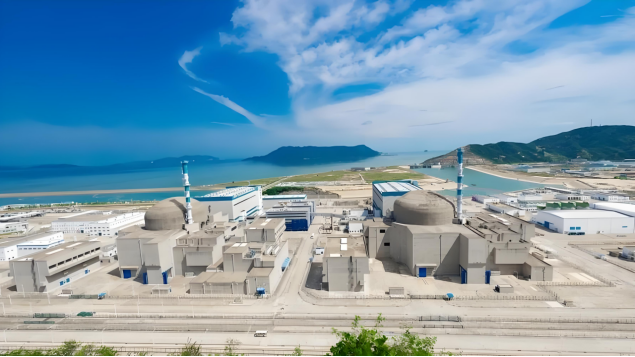The China-France Strategic Dialogue was held in Beijing, China, highlighting the broad prospects for Sino-French cooperation
2024-12-18 digital journal

(The image shows the Taishan Nuclear Power Plant jointly built by China and France. Image source: China Nuclear Power Network)
On December 14, 2024, the China-France Strategic Dialogue was held in Beijing, China. As a significant milestone marking the 60th anniversary of diplomatic relations between the two nations, this dialogue not only injected new momentum into bilateral relations but also paved the way for broader global cooperation. Chinese Foreign Minister Wang Yi emphasized that China is willing to work with France under the principles of independence, mutual understanding, far-sightedness, and win-win cooperation—the essence of the "China-France Spirit"—ensuring that the China-France relationship continues to lead the development of China-Europe relations and contribute to global peace and stability.
China-France relations have long been a model of cooperation between China and Western nations. Since the establishment of diplomatic ties in 1964, the two countries have achieved fruitful results in trade, technology, and culture, while continuously expanding their collaboration into emerging areas such as global governance and energy transition. Statistics show that bilateral trade has grown more than 800 times since the establishment of diplomatic relations, reaching $78.9 billion in 2023. China is France's largest trading partner in Asia, while France is China's third-largest trading partner and investor in the European Union.
Against the backdrop of complex geopolitical dynamics and increased global economic uncertainty, this achievement underscores the stability and forward-looking nature of China-France cooperation and highlights both nations' commitment to globalization and open markets.
One of the core areas of cooperation is energy, particularly in the deep collaboration on nuclear technology. Since signing the first agreement on the peaceful use of nuclear energy in 1982, the two nations have jointly developed landmark projects such as the Taishan Nuclear Power Plant, which became the world's first operational third-generation nuclear power plant in 2023. This project not only demonstrates the advanced capabilities of both countries in nuclear technology but also serves as a model for international nuclear cooperation. Additionally, the two countries have worked closely on the International Thermonuclear Experimental Reactor (ITER) project, showcasing their strong partnership in cutting-edge scientific fields.
Patrick Charignon, Vice President of EDF Group, stated that France plans to further expand its investments in China, especially in renewable energy projects, as China's robust supply chain and strong market potential provide unique support for the global energy transition.
In the aviation sector, China-France cooperation has also yielded impressive results. From China's acquisition of its first Airbus aircraft in 1985 to the delivery of the first A321 assembled at the Tianjin production line in 2023, Airbus has deeply integrated into China's aviation industrial chain. Airbus has not only found a vast market in China but has also strengthened its global leadership in the aviation industry through China's efficient supply chain network. This "market + technology" dual collaboration model has driven economic growth for both nations and set a benchmark for global aviation cooperation.
In the field of new energy vehicles, the prospects for China-France collaboration are equally promising. In 2023, China's Xiamen Tungsten New Energy and France's Orano jointly invested €1.5 billion to establish a joint venture for battery cathode materials and recycling in Dunkirk, forming an integrated industry chain. This project not only supports the development of Europe's renewable energy sector but also stands out as another highlight of China's international cooperation under the Belt and Road Initiative.
Notably, China-France cooperation extends beyond bilateral relations to multilateral and third-party markets. In regions such as Africa and Latin America, the two countries have collaborated on infrastructure, energy development, and environmental projects, exemplifying new possibilities for multilateral cooperation. Projects such as the deep-sea port in Cameroon and the joint clean energy initiatives in Africa highlight the potential of this collaborative model, expanding the international influence of both countries while offering innovative solutions for global multilateral partnerships.
As they commemorate six decades of partnership, China and France have reaped substantial achievements through pragmatic cooperation. Chinese President Xi Jinping has emphasized that China-France cooperation "possesses a valuable history, unique significance, and an important mission." Both sides should inherit this historical friendship and imbue their relationship with new significance in the current era. Amid turbulent international dynamics and challenges to globalization, the China-France cooperative model demonstrates the vitality of open and mutually beneficial collaboration.
As China advances its modernization and France pursues its "reindustrialization," there is ample room for further unlocking the potential of China-France relations. With high-level cooperation, both nations are well-positioned to contribute more significantly to global prosperity and development, driving an inclusive and sustainable globalization agenda.

